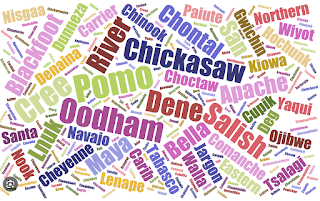I recently read a story in the Smithsonian Magazine and the National Museum of the American Indian in an article called “Waking a language from its slumber” by Kasike Jorge Baracutay Esteve. He has been a cultural activist wishing to bring back the Taino language to the indigenous people of the Caribbean. This has become an important issue to many tribes in the States as well. My first thought was … why?
A fascinating paper called “Native Language Revitalization: Keeping the Languages Alive and Thriving” by Amy M. Gannet at Southeastern Oklahoma University goes into the subject in great depth. Every other sentence is footnoted so maybe it is a Phd thesis. She says that there are approximately 7,000 languages in use today and that by the end of this century 50-90% will be extinct. Again, why is this happening?
I believe I have found a major reason as regards the Native Americans. You have probably heard about the Indian Boarding schools where the relatively new Americans wanted to “tame the savages” by teaching the Indians Anglo ways. You have maybe heard Governor Ron de Santis say, something to the effect that there was nothing here until we came. This unfortunately was, and seems still is, the attitude of many.
 |
| Some of the Native American Languages |
Language is part of cultural heritage. An element of understanding is lost in translation, particularly in imparting stories of the past where words have no modern equivalent. Even though Latin and ancient Greek lie at the root of modern Western languages and continue in scientific vocabulary their study has been dropped from the school curriculum. Only specialized scholars can access the great works of Socrates, Plato, Aristotle, and Homer in the original. Per example
A fragment of the second book of the Elements of Euclid, the ancient Greek mathematician, was discovered in 1897 at Oxyrhynchus, Egypt.
Bringing back all languages that are dying out may not be possible but for those that can be revived an important understanding of history and identity can be passed on to future generations.




No comments:
Post a Comment